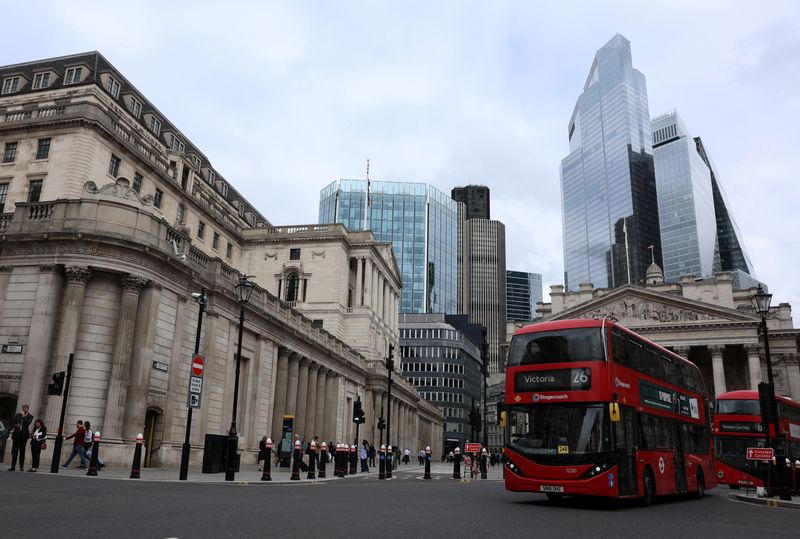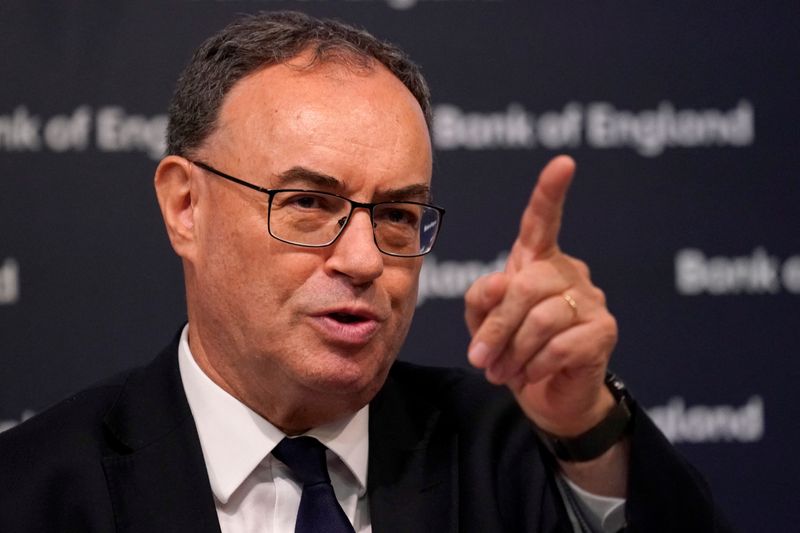By William Schomberg and Suban Abdulla
LONDON (Reuters) - The Bank of England could move more aggressively to cut interest rates if inflation pressures continue to weaken but conflict in the Middle East could push up oil prices, Governor Andrew Bailey said.
Bailey told the Guardian newspaper the BoE could become "a bit more activist" and "a bit more aggressive" in its approach to lowering rates, if there was further welcome news on inflation for the central bank.
Sterling - which has strengthened recently as investors saw fewer interest rates cuts in Britain than in other countries - was down by more than a cent against the U.S. dollar at 1025 GMT, on track for its biggest daily fall in almost six months.
It also looked set for its sharpest daily drop against the euro in almost two years.
Investors were assigning a 97% chance of a quarter-point interest rate cut by the BoE at its November meeting. On Wednesday, the chance of a cut next month was priced at 90%.
The BoE's benchmark Bank Rate now sits at 5% after August's first reduction in borrowing costs in four years. The British central bank kept rates on hold last month but investors expect another quarter-point cut at its November meeting.
Rob Wood, chief UK economist at Pantheon Macroeconomics, said the central bank seemed to be heading towards a speeding up of its rate cuts but the Monetary Policy Committee would still need to see an easing in wage growth and price pressure to cut borrowing costs in consecutive meetings.
"The bar to MPC rate cuts in back-to-back meetings is falling, leaving the risks to our Bank Rate forecast skewed to faster cuts," he said. "That said, we think the latest DMP fails to green light those faster cuts, with wage growth and price rises proving stubborn."
The BoE's Decision Maker Panel survey and separate services sector data, both published on Thursday, suggested inflation pressures in the economy were weakening but remained stronger than normal.
The DMP survey showed expectations for wage growth in the coming 12 months stood at 4.1%, down from an increase of 5.7% in the three months to September although it was unchanged for a third survey in a row.
Services companies reported that the prices they charged rose at the slowest pace in nearly four years.
The Guardian quoted Bailey as saying he was encouraged by how inflation pressures had proven less persistent than the Bank feared but the events in the Middle East posed a risk.

"Geopolitical concerns are very serious," Bailey told the newspaper. "It’s tragic what’s going on. There are obviously stresses and the real issue then is how they might interact with some still quite stretched markets in places."
He said there appeared to be "a strong commitment to keep the (oil) market stable" but "there’s a point beyond which that control could break down if things got really bad. You have to continuously watch this thing, because it could go wrong."
